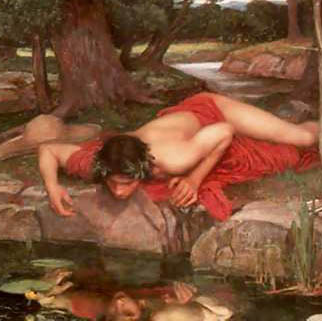Narcissus (mythology)
|
|

In Greek mythology, Narcissus or Narkissos (Greek Νάρκισσος), a hero of the territory of Thespiae in Boeotia who was renowned for his beauty and his pride. Several versions of his myth have survived.
Ovid, from his Metamorphoses, (3.341–510) is probably the best known. According to Ovid, Narcissus was the son of the Boeotian river Cephissus and the nymph Liriope (otherwise unknown). Narcissus, who had "just reached his sixteenth year" (fifteen, by modern standards), spurned the love of both youths and girls. A nymph, Echo, loved him, but she could never get his attention. He was riveted to the water's edge, entranced by the beautiful boy he thought he glimpsed within, and she eventually pined away longing for him... until nothing was left of Echo but her sad, pleading voice. Narcissus thought the image in the water was real and pined away with desire, eventually transforming into the flower that bears his name.
Pausanias (9.31.7) locates the spring of Narcissus at Donacon 'Reed-bed' in the territory of the Thespians. Pausianias finds it incredible that someone could not distinguish a reflection from a real person, and cites a less known variant in which Narcissus had a twin sister. Both dressed the same and wore the same kind of clothes and hunted together. Narcissus fell in love with her. When she died, Narcissus pined after her and pretended that the reflection he saw in the water was his sister.
Another version claims that Ameinias, a young man, loved Narcissus but was scorned. To tell Ameinias off, Narcissus gave him a sword as a present. Ameinias used the sword to kill himself on Narcissus' doorstep and prayed to Nemesis that Narcissus would one day know the pain of unrequited love. This curse was fulfilled when Narcissus became entranced by his reflection in the pool and tried to seduce the beautiful boy, not realizing it was himself he was looking at.[1] (http://www.androphile.org/preview/Library/Mythology/Greek/Narcissus/narcissus.htm)
As Pausanias also notes, yet another tale is that the narcissus flower was created to entice Demeter's daughter Core away from her companions to enable Hades to abduct her.
Narcissism is named after 'Narcissus,' and both derive from the Greek word narke 'numb' from which we also get the word narcotic. Thus for the Greeks Narcissus stood for callousness and insensitivity, as he was emotionally numb to the entreaties of those who fell in love with his beauty.
Spoken-word myths - audio files
| The Narcissus myth as told by story tellers |
|---|
| 1. Narcissus, read by Timothy Carter, music by Steve Gorn, compiled by Andrew Calimach |
| Bibliography of reconstruction: Ovid, Metamorphoses III.340 - 350, 415 - 510 (8 CE); Pausanias, Description of Greece 9.31.7 (143 - 176 CE) |
See also
External links
- Article on a new version of the myth (http://www.papyrology.ox.ac.uk/news/narcissus.html) found in a papyrus from Oxyrhynchus
- The story of Narcissus (http://www.haidukpress.com/LLU/listen.html) An audio version (in MP3 and other formats) of the original story, compiled from primary sources.
Template:Commonsde:Narziss fr:Narcisse (mythologie) it:Narciso (mitologia) nl:Narcissus ja:ナルキッソス pl:Narcyz sv:Narkissos tr:Narcissus
